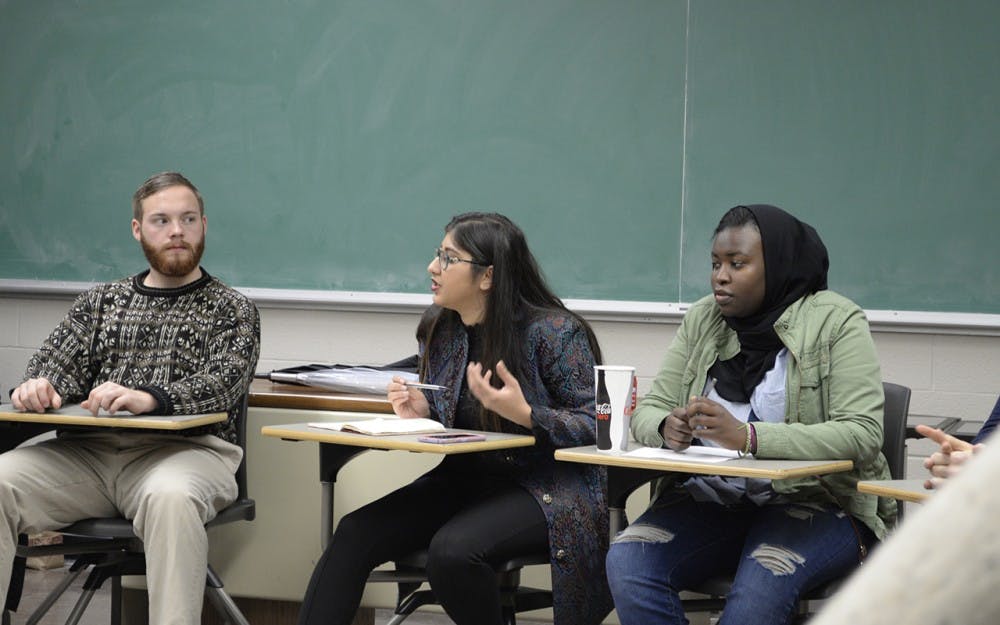Laughter rang out Sunday night on the third floor of Ballantine. The topics — drugs, race and incarceration — being discussed in Ballantine 317 were serious, but junior Kinza Abbas and fellow student Yassmin Fashir did not let that stop the discussion group from smiling and laughing.
Abbas and Fashir are part of IU’s CommUNITY Education Program and encourage discussion on diversity and social justice at IU and Bloomington.
“What are some stereotypes you’ve heard about places, people and violence?” Abbas said.
The group brought up several stereotypes: super predators, ghettos and the prevalence of drugs in black communities. Perri Smith, an IU student in attendance, said these stereotypes exist because people base their ideas and stereotypes about race on the past.
“We’re basing the future off the past when the past didn’t work,” Smith said.
To better inform the discussion about the origins of the black criminality myth, the group watched a clip from the Netflix documentary “13TH.”
The documentary details the 13th Amendment loophole that allowed many African Americans to be enslaved for minor criminal offenses after the Civil War.
Though slavery as an institution was eliminated at the end of the Civil War, it was still allowable under the amendment as punishment for a crime. Historian Jelani Cobb said in the documentary the myth of black criminals arose in this same period.
“The 13th Amendment loophole was immediately exploited,” Cobb said in the documentary.
Abbas said the discussion was also designed to look at a play soon to show at IU called “Exonerated.” The play is about six people, black and white, who were wrongly convicted and then exonerated for their crimes years later.
“We wanted to explore that racial element,” Abbas said.
While the group began with discussions of race and their effects on the criminal justice system, the conversation quickly progressed to drugs. Sophomore Erin Miles, an IU nursing student, said she works in an emergency room and addiction is not handled well in general and should not be treated as a criminal offense.
She said often nurses patch people up in the emergency room and they are picked up or penalized for their addictions by police.
“The only reason it’s a problem is because we’ve made it one,’ Miles said.
Miles said there is a real stigma around drug addicts as bad people. The stigma hampers what they can and cannot do in society.
“You don’t want to take care of bad people,” Miles said. “That’s a stigma in the medical community.”
Miles also said if someone makes one mistake, some people assume they are a bad person for life, rather than try to help them. Lloyd Graham, another IU student, said that outlook is too simple. Graham said legislation tries to deal with complex problems in simple ways and it is not helpful.
“Keeping things simple is how we’ve always had it,” Graham said. “We don’t question it.”
Just as the 13th Amendment allowed for the re-enslavement of African Americas, the criminal justice system can effectively do the same to other people, as well as African Americans, by dehumanizing them, Abbas said.
“You can still create spaces where people are not human beings,” Abbas said.
These spaces exist today, Miles said. However, she said the idea of the justice system as unfair was not something she grew up with or what she was taught.
“I was raised to believe the system was fair,” Miles said.
Graham said he thinks the simplicity of the justice system is a huge problem. He said a one-size-fits-all justice system lets people slip through the cracks. Miles agreed and said instead of a system that works for the average person, it should work for the people on the outskirts and the edges.
Fashir also asked the group where they saw the issue of race in drugs to bring the conversation full circle.
Miles said the issue of drugs has grown since it has moved into white and well-off communities, but the emphasis changes. Rather than people doing drugs in those communities, the discussion often revolves around the idea the drugs are happening to them.
At the end, Fashir said these issues of race, drugs and justice belong to everyone and need to be discussed.
“Everyone is responsible in a sense,” Fashir said.




